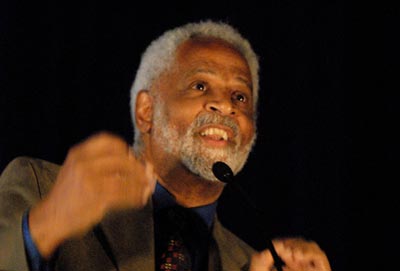UC Berkeley Web Feature
 |
Sociologist
Troy Duster addresses a UC conference
on diversity and inclusion. |
Changing the culture of the academy
In UC conference keynote address, Troy Duster casts
a sociologist’s eye on the dynamics of challenging,
and defending, the traditional curriculum
BERKELEY — In May 1967, during a visit to Berkeley, Martin Luther King, Jr. told a crowd of student anti-war protesters in Sproul Plaza, "You, in a real sense, have been the conscience of the academic community and our nation." On Thursday, March 22, just shy of 40 years later, the "conscience" of the UC community turned its attention to the university itself, in a daylong conference — a few steps away from Sproul Plaza, inside the Martin Luther King, Jr. Student Union — on "Changing the Culture of the Academy" to meet the needs of a diverse state and nation.
Setting a context for the day's conversation, the distinguished sociologist Troy Duster — a UC Chancellor's Professor, a member of the New York University faculty, and a past president of the American Sociological Association — gave the morning keynote address. The gathering, nearly 600 strong, included graduate students of diverse backgrounds from each of the UC campuses — many of whom, having gained access to the university against the odds, nonetheless feel less than fully included in its life. The conversation was about why and how this phenomenon exists and what is to be done.
 Shedding
a sociological light on issues of access and inclusion,
Duster opened with an anecdote about a Spanish colleague
whose young son, during a stay in England, learned
in school about the "great" British
seaman, explorer, and military commander Sir Francis
Drake. This was the same historical figure, the boy
eventually realized, who back in Spain is known as "El
Pirata," the
pirate, whose actions as a privateer, plunderer,
and slavetrader earned him a reputation as a "combination
of Darth Vader and Adolph Hitler," as
Duster put it.
Shedding
a sociological light on issues of access and inclusion,
Duster opened with an anecdote about a Spanish colleague
whose young son, during a stay in England, learned
in school about the "great" British
seaman, explorer, and military commander Sir Francis
Drake. This was the same historical figure, the boy
eventually realized, who back in Spain is known as "El
Pirata," the
pirate, whose actions as a privateer, plunderer,
and slavetrader earned him a reputation as a "combination
of Darth Vader and Adolph Hitler," as
Duster put it.
When there's just one Spanish student in a British classroom "caught between two versions of history," the student typically struggles with the contradictory information alone, without the endorsement of the teacher. Tying this observation into the concerns of the conference, Duster said that those students who pave the way for others of their background, in what he called the "first period of access" to the university, typically raise questions about the traditional curriculum (particularly in the social sciences and humanities) and "are typically marginalized and regarded as political" for doing so.
Duster drew on experiences at Berkeley — where he taught in the sociology department and was founding director of the campus's Institute for the Study of Social Change for nearly two decades — to bring this observation home. In the mid 1960s, he noted, African Americans made up only 2.3 percent of students in Ivy League schools, 2.7 percent at Berkeley. By 1968, Berkeley's sociology department had only two black graduate students; concerned with this situation, Duster and a few colleagues successfully recruited nine African American students and one Latina, he recalled.
But these students soon began to question the curriculum, saying "that they didn't see enough of their perspective or their communities" in what was being taught, he said. Besides European intellectuals — Durkheim, Marx, Weber, and Gramsci — "they wanted some Frantz Fanon," the Martinique-born thinker whose works inspired a wave of anti-colonial liberation movements around the world. "My faculty colleagues took offense at having given access to these students" only to have them turn around and challenge the curriculum, Duster recalled.
For three to four decades, he asserted, students from historically underrepresented groups — among them ethnic minorities, students with disabilities, gays and lesbians — who have gained admittance to academia have encountered this dynamic. Faculty tend to view the canon as the "neutral march of knowledge," he said, and those who challenge the "eternal verities" are "not seen as being intellectually serious but as being the mavericks who are politically engaged in a struggle that's illegitimate."
"A university is a remarkably stodgy elephant that doesn't dance," Duster quipped. But there are pockets of any campus "where one can find activities which are challenging. Change will begin to happen when you become active about engagement."
In the course of the day, 27 panels took up different facets of access and inclusion, from disability in the learning environment to the Constitutional basis for diversity, and generated ideas about possibly steps to promote change. The following day, key stakeholders — including graduate students, graduate deans from throughout the UC system, and representatives from the UC Office of the President — met to review each group's comments and prioritize action items. In response to one suggestion, says Gloria Chun, co-organizer of the conference, the intention is to hold a systemwide conference on diversity concerns once every year or two, each time on a different UC campus.
A webcast of selected segments of the conference — the opening session including Troy Duster's talk, the morning plenary session, and the afternoon keynote address by the 2006-07 UC student regent Maria Ledesma — will be available online.

